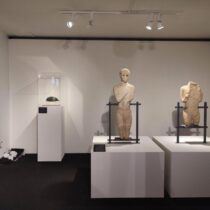Although the Greek State depends considerably on its ancient heritage, both for tourism and national reasons, there are few places available to Archaeology graduates. The limited number of archaeologists who get the opportunity to participate in research programs —mostly through nepotism, regardless of objective evaluation— gain nothing more than a temporary occupation and a meagre salary. If there is a vacancy in the 300 permanent positions of the Archaeological Service —the main administrative, research and restoration/conservation entity of the country,both university degrees and postgraduate studies, for which the state offers scholarships, are downgraded and the candidates, as common civil servants, have to pass examinations on a very wide spectrum of subjects (numismatics, inscriptions, etc.). Depending on their field of interest, Prehistoric and Classic or Byzantine archaeology, these candidates have to possess a vast knowledge of information ranging from the Prehistoric Age to the Late Roman period or from the fourth century AD up to and including the eighteenth century. It would be much fairer if they could be evaluated on the basis of university calendars, curriculum vitae, letters of recomendation and an oral interview. An ideal solution would be the employment of needed specialities not by each Ephorate but by province; or alternatively the establishment of local Institutes staffed with specialized archaeologists. All the forementioned proposals point at the necessity for a generous budget that will permit the increase of work positions. Responsible
information, open excavations and archaeological exhibitions should at the same time acquaint the public with the painstaking work and cultural contribution of archaeologists.


